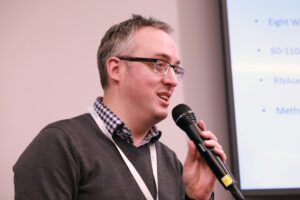We’ve invested £750,000 to understand what happens in sarcoma, and build the groundwork for improved diagnosis and treatment.
Five years on from the first £250,000 investment, we’re already seeing impact.
The science of genomics
Like other cancers, sarcoma is caused by changes in the genetic code, called mutations. Mutations act like spelling errors in the instructions for a person’s genetic makeup. However, with over 100 subtypes, sarcoma is challenging to diagnose accurately and understand – even for expert pathologists. Subtypes are often characterised by particular genetic mutations, meaning that understanding them can be key to ensuring not only the correct diagnosis, but also the correct course of treatment for patients.
Since 2012, the 100,000 Genomes Project has been collecting tissue samples from people with rare conditions and their families – including sarcoma. Beginning in 2018, our Genomics Research Programme aimed to bring together the best minds and the latest technologies in sarcoma research, to use data from the Project to advance our understanding of sarcoma.
Read more about why genomics is important for sarcoma.

Exploring why sarcoma is sarcoma
Led by Professor Adrienne Flanagan, a team of scientific experts from across the UK examined and catalogued the breadth of variation in genetic mutations in sarcoma for the first time, creating one of the largest and most comprehensive libraries of genetic drivers in sarcoma in the world.
The team uncovered answers about many ultra-rare subtypes of sarcoma for the first time, such as desmoplastic fibroblastoma and malignant peripheral nerve sheath tumours. And although we’re a long way from personalised medicine in sarcoma, findings from the project could help identify patients who are suited to specific targeted therapies.
For example, the team found that when certain key mutations arise in chondrosarcoma (specifically in the IDH1, IDH2 and TERT genes) these are linked to poorer outcomes. The team were able to conclude that diagnostic testing for these mutations could help guide treatment and monitoring for patients.
Mapping what goes wrong in each cell

Building on the first project, we awarded our second grant to Professor Andrew Beggs at the University of Birmingham, exploring the genomics of liposarcoma. The team turned to advanced techniques which can dig into the details of exactly what happens in liposarcoma. By using single cell sequencing, the team were able to spot any faults in each individual liposarcoma cell and have amassed the world’s largest cohort of liposarcoma single cell genomes. Analysis of the genomes continues, and the team think that will help us unlock the mechanisms of immunotherapy resistance in liposarcoma.
 Developing new treatments
Developing new treatments
2020 saw us award the third £250,000 grant under this programme to Dr Zoë Walters, based at the University of Southampton. Dr Walters and her team are taking genomic data to identify specific genetic changes which cause dedifferentiated liposarcoma. The team are looking at networks of genes to understand how they interact together – almost like a social network between people. They will then explore if these genetic changes can be successfully targeted with drugs, with the hope of identifying a new and better treatment for this sarcoma.
What’s next?
The groundwork laid by these projects continue to pay dividends. As a result of Prof Flanagan’s grant, the team have secured more than £2 million in further funding from organisations such as Children with Cancer, the Connective Tissue Oncology Society and Tom Prince Trust, as well as securing many of the analysts further fellowship roles in sarcoma research. The results of the project should also improve patient experience in the clinical setting. The team optimised long read sequencing technology for sarcoma, which should help turnaround times for patients accessing whole genome sequencing.
Although the formal Genomics Research Programme has come to an end, Sarcoma UK is still investing in genomics. By harnessing the insights gathered through this programme to drive further studies, we hope the results from these projects will continue to contribute to improved outcomes for people with sarcoma for years to come.












